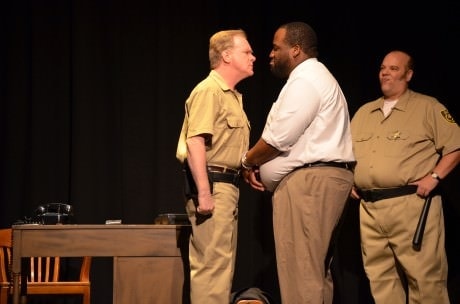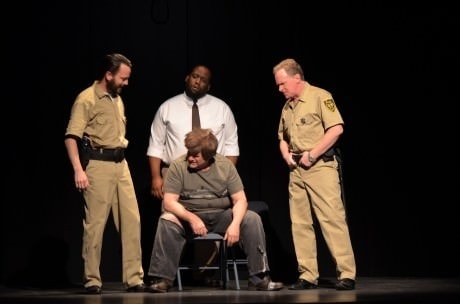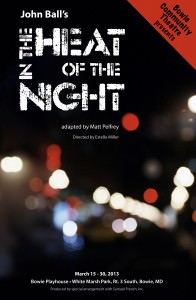Argo, Alabama 1962. A white man’s death leads to the arrest of a black out of town off-duty police detective. The Emmy-Winning TV show winds itself together in this racially-charged crime thriller on the stage as the Bowie Community Theatre presents John Ball’s In The Heat of the Night. Directed by Estelle Miller, this play brings all of beloved characters from the television series and Academy Award-winning film together for one night of drama that will sharpen your crime solving skills and introduce you to a backward world from a time long past where the whole town will turn easily against you for a little bit of money.
The acting in this play is solid talented acting. The problem, however – at my performance – lies in the overall blocking and staging of the production as well as the set design. Director Estelle Miller, doubling as the Set Designer, unfortunately eliminates all the momentum built up by her talented cast from scene to scene as the momentum gets lost in the seemingly unending darkness of the elongated scene changes. Stage hands spend long agonizing moments shuffling furniture on and off in the darkness on two opposite corners of the stage. With such long periods of darkness it was difficult to stick with the story, the scenes felt as if they no longer related to one another- unable to carry over into the following scene. Miller uses one fraction of the vast space and spends too much time having the varying scenes switch locations. Let me strongly suggest that she tighten up the overall blocking of the show would cut down on these scene changes, thus negating the loss of momentum between scenes.

Photo by John Nunemaker.
Lighting Designer Garrett Hyde also contributes to the disconnect with his abrupt lighting shifts. Many of the scenes are brief occurrences between one or two characters and Hyde sharply ends the scene with a crisp blackout, only about half the time these blackouts happen as the actors on stage are still speaking their final lines— leaving the audience confused and those last few words misheard or all together unheard. To Hyde’s credit, however, he does great work with effect lighting, both when creating the police car red lights and the passing car headlights during the driving scenes.
To Miller’s credit she does run a solid show in regards to the vernacular and execution of a southern Alabaman accent among her cast. Every cast member that’s meant to sound like a backwoods hick does so exceptionally well, putting the audience in the right geographic location for the play’s setting. Ken Kienas does a particularly decent job of making his accent over exaggerated for his varying roles, each one slightly distinct while still sounding familiar, creating that illusion that everyone in the small backwoods town sounds the same because there are so few of them.
One of the overarching motifs in this production is easily riled up tempers. And just about everyone in the cast gets their chance to vocally explode, Kienas being no exception, particularly when he’s playing Harvey Oberst, accused of murder. His whining southern accent gets a panicked elevated sound to it, really emoting his innocence when being badgered for answers by the town authority.
Having an equally violent temper with a snotty attitude to boot is Pete (Jeff Mocho). The macho man with a racial chip on his shoulder, Mocho embodies the young officer with a focused sense of self-importance that makes him easy to dislike. He’s ornery without being rowdy, just enough of a nuisance to get under your skin and leave a vile taste in your mouth after watching him on stage. Mocho’s anger flares toward the dramatic ending of the production and it’s certainly a sight worth seeing.
But Mocho’s temper looks like a cool spring shower compared to Chief Gillespie (James Estepp). Being a hot-headed loose cannon with a short fuse, Estepp attacks the character’s anger issues with vocal explosions, constantly shouting and growling his lines to deliver his point. His volume and raging tongue is only outdone by the way he flings his body and head about in these moments, making him one bad guy you don’t want to mess with, even if he is a good guy in regards to his role in the story. Estepp has a good working knowledge of comic timing; the few lines that do earn his character a good chuckle from the audience are delivered without missing a beat.

Sam Wood (Joe Del Balzo) is a complex character who develops an unlikely friendship with Virgil Tibbs (Sean James). Del Balzo’s approach to the other characters varies drastically while maintaining a professional air about his persona. His interactions with Virgil go from friendly understanding to furious fighting in a quick pinch, but his overall grounded nature rides the character through to a successful finish. Del Balzo is quick to defend Virgil during nasty situations but just as quick to turn on him when the detective gets too close to the truth.

If you can slog through the endless scene changes, the quality of the acting from this exceptional In the Heat of the Night cast will be your reward in this production.
Running Time: Approximately two hours with no intermission.
In the Heat of the Night plays through March 30, 2013 at the Bowie Playhouse — in White Marsh Park – 16500 White Marsh Park Drive, in Bowie, MD. For tickets, call the box office at (301) 805-0219, or purchase them online.




